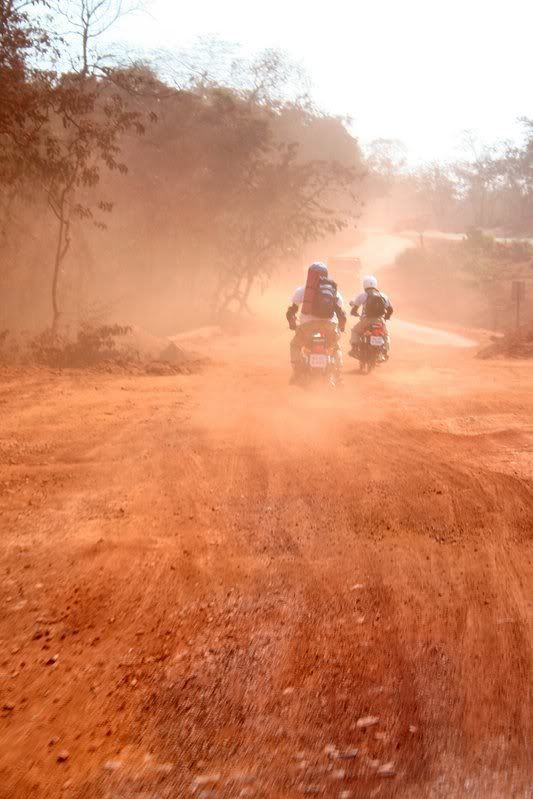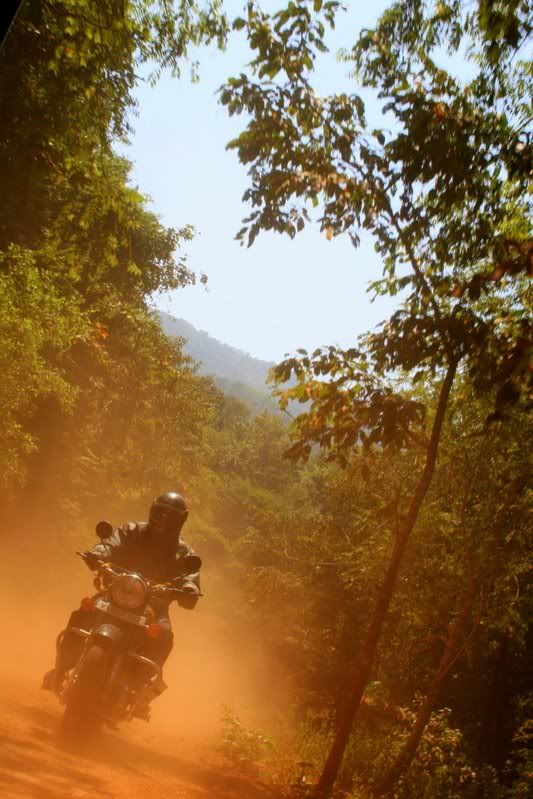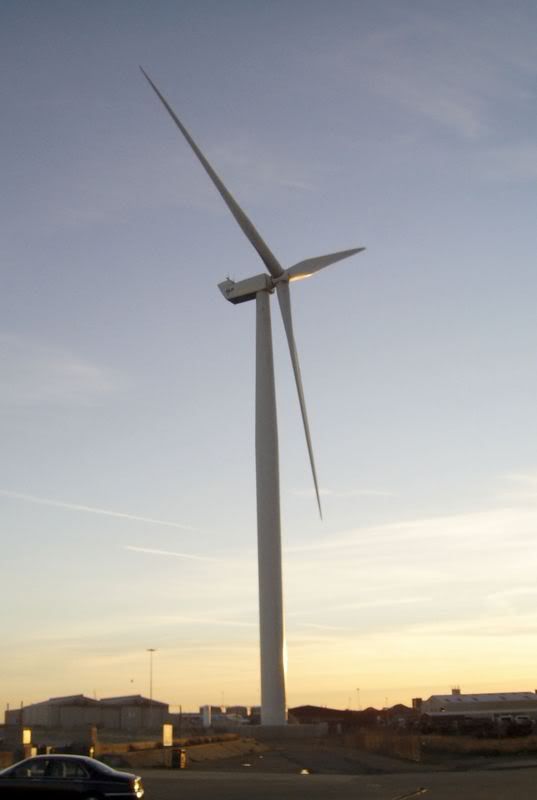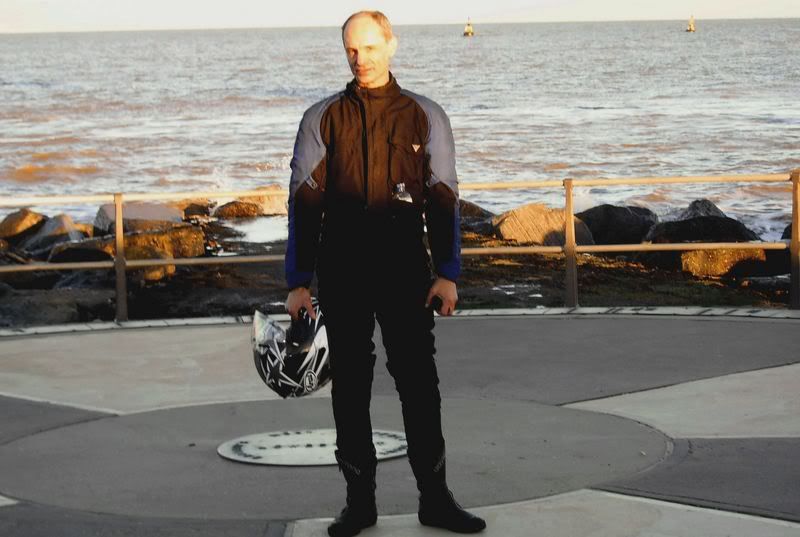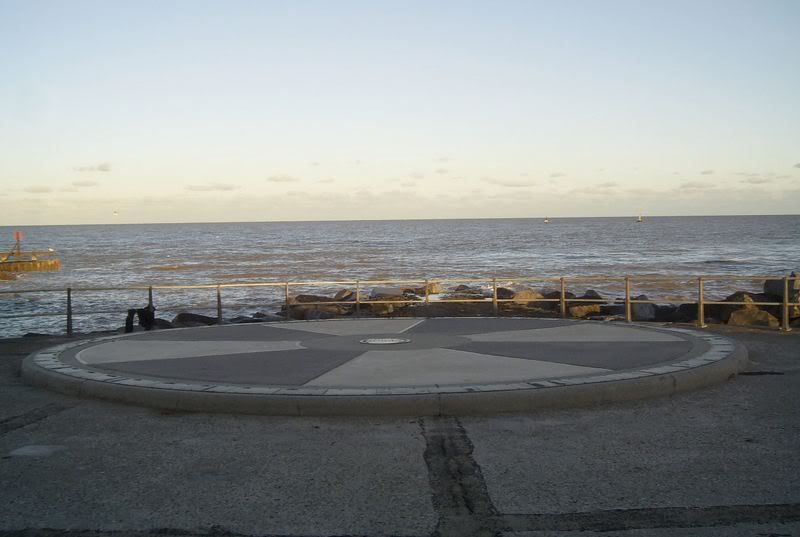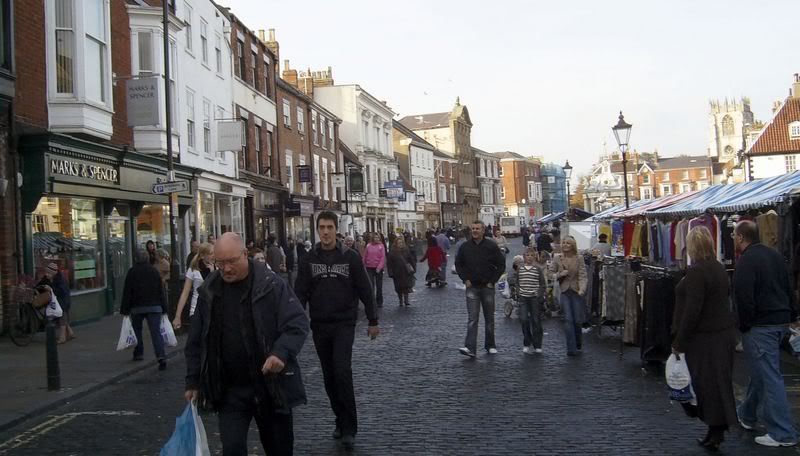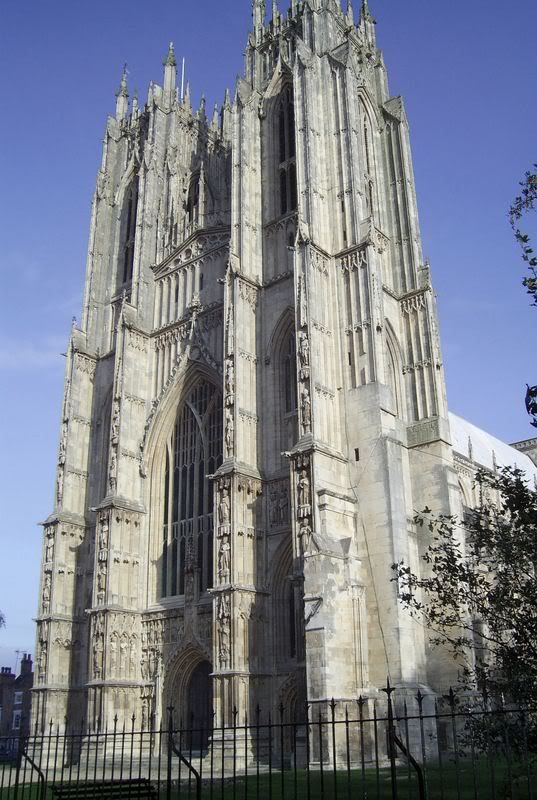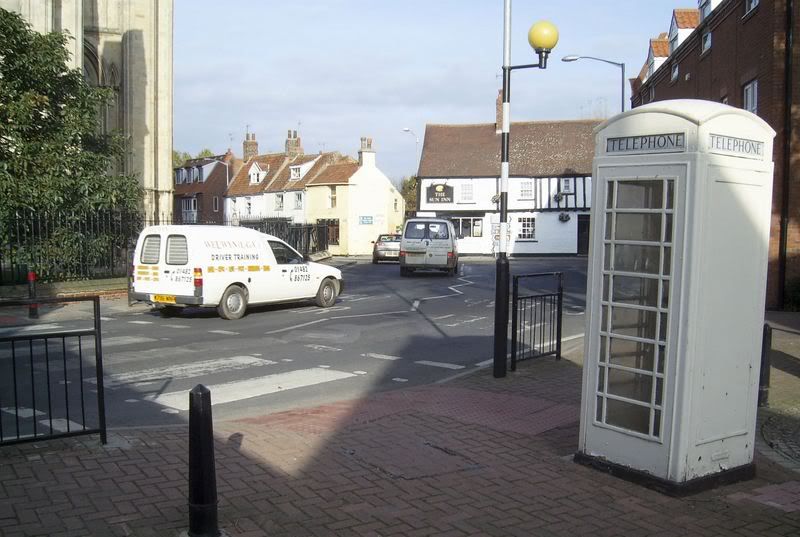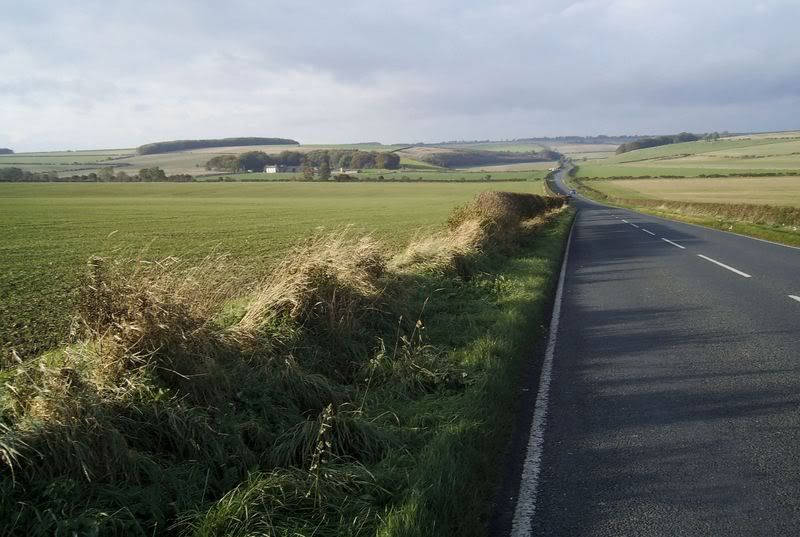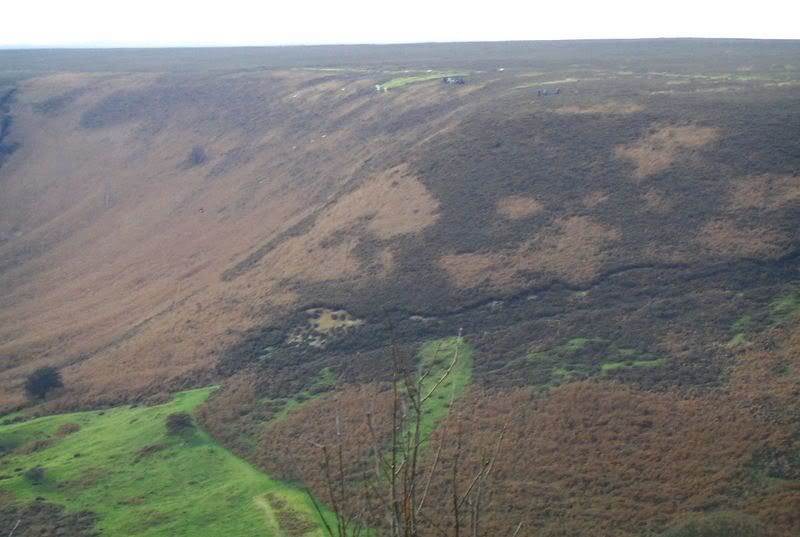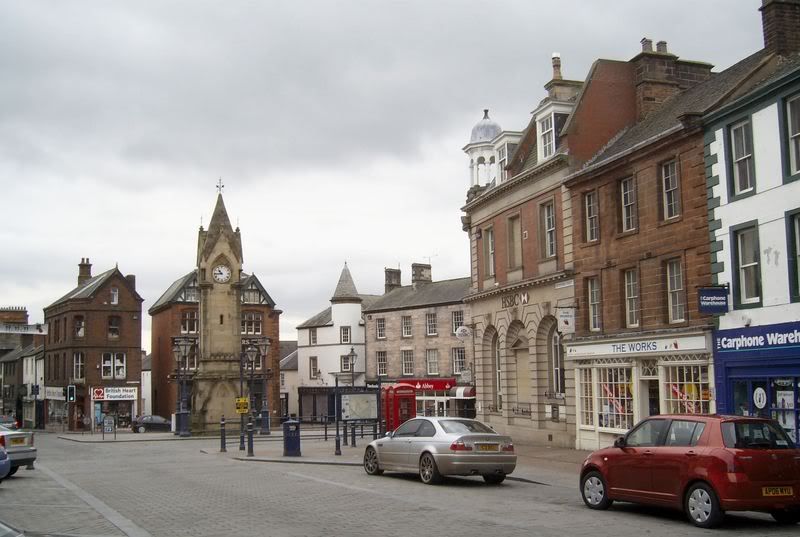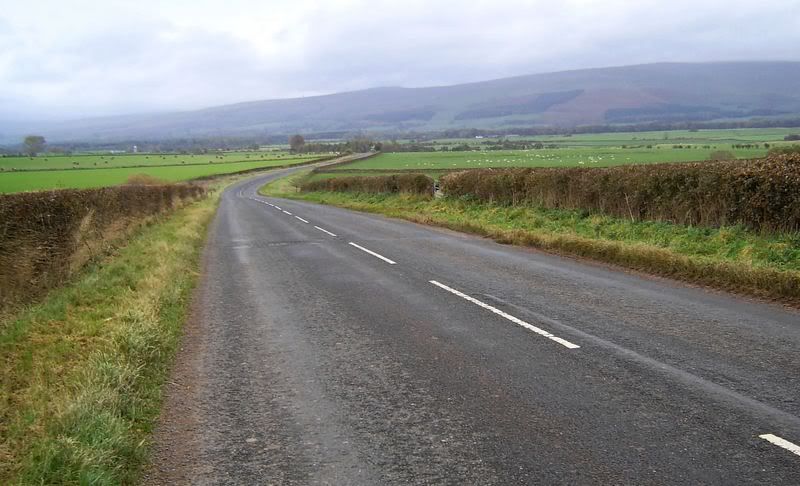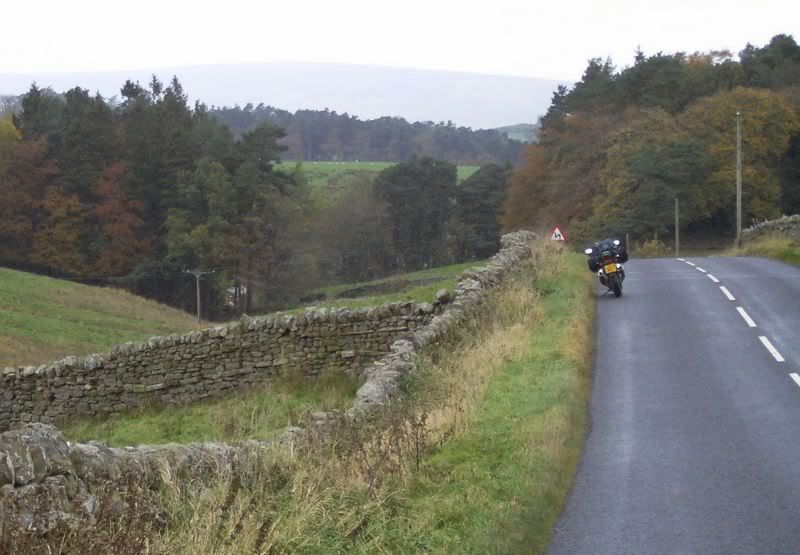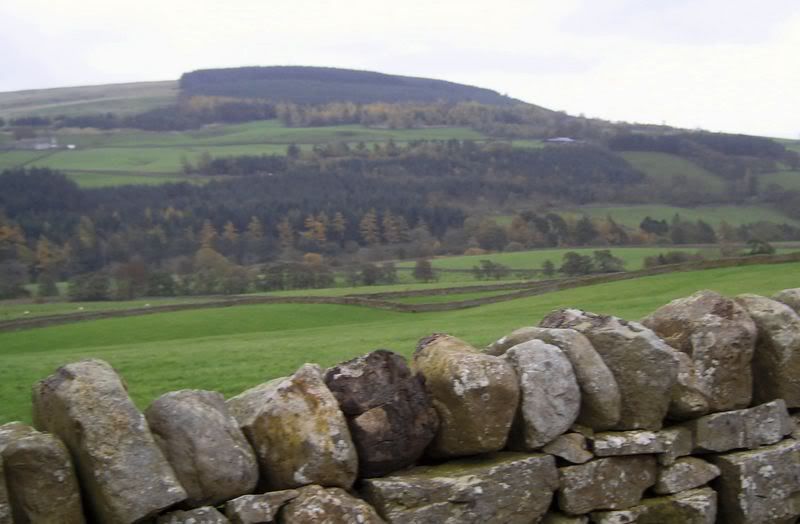Monday 6 November Day 4
265 miles
Included:
Point to Point: John O’Groats
North Cardinal Point, Dunnet Head
I ate breakfast and was out of the B&B by nine. I made a quick stop at an auto shop to get some chain lube for the bike and then I was off in a good mood, heading for the far north and Dunnet Head.
Late last night I’d had a brilliant but simple idea. If I was not going to bother using my tent this holiday there was little point in lugging all my camping gear about with me. Why didn’t I just book into the B&B for another couple of nights, dump all my gear in my room, use it as a base and go for day rides to all the places on my schedule. All I would need to take with me were the few essentials that would fit into my tank bag.
I reckoned I could make this work very well.
So, putting a few details together, I came up with this. Today I would ride up to John O’Groats and Dunnet Head (The North Cardinal Point) making use of fast roads. I'd then cut down to the DVLA best bike routes #2 and #3 on the west coast. I could manage all that before nightfall, I reckoned. And after that I could make my way back to ‘Myrtle Bank’ (the B&B at Fort William). The last part of the journey would be in the dark, but it was all along main roads, so there shouldn't be a problem. It would be a long ride and a hurried one but I was sure it would be great.
Then, tomorrow, I’d ride out to Ardnamurchan Point (The West Cardinal Point). That would be a much shorter trip, but I could take my time with it and I would probably need an easy day after today. I would then have plenty of time to ride back south on Wednesday, visit Vicky and Sats in Manchester and pick up the remaining DVLA bike routes. These were all down the west side of England or just over the border into Wales. Some things were just meant to be, I thought. It was a good plan. But entirely impractical. It was just that I didn’t know it then.
Apart from the last few miles, the roads up to John O’Groats and Dunnet Head are all dark green on the map (major routes). They looked so slick and easy to ride as I pored over them in my room before going to bed on Sunday night. I could be up in the north in no time. I’d take the A82 straight up the Great Glen to Inverness. At Inverness I’d pick up the A9 and then the A99 which between them run all the way along the north-eastern coast as far as Wick. After that the roads turn red for the last forty miles to my destination. But red is still good and should be easy to ride.
After that I had several choices of route to bring me back down onto the west coast, depending on the hour and the weather and my mood. I’d have to put on some speed where I could, and I would have to miss seeing the north-west of the country, which is the wildest part. But realistically I wasn’t going to be able to see everything anyway.
The ride out of Fort William was languid and easy. It was a beautiful day. If it continued like this, I was going to be in for a memorable ride. And the scenery was unsurpassable. I didn’t get far before I had my first “Oh!” and the first of those overwhelming urges to stop the bike and get out the camera. As the road rose up the side of a low hill, a spectacular panorama of the Great Glen below was opening out to one side. The morning sun sent splashes of gold over the high peaks. Great chunks of mountainside glowed like Greek icons. Cloud shadows threw patches of hillside into mysterious shade. The lochs gleamed.
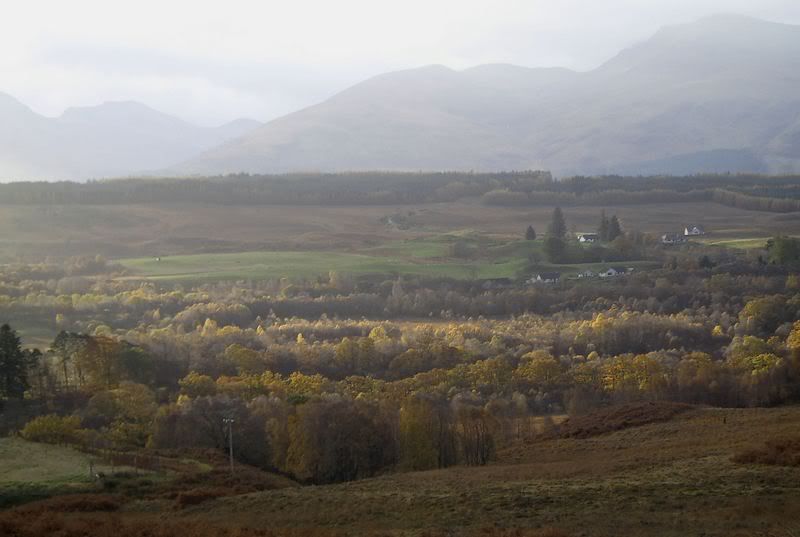
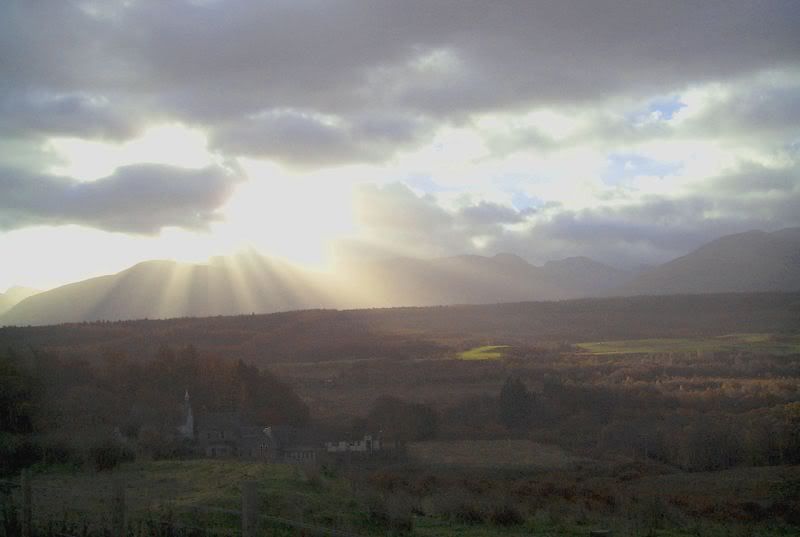
I pulled up. A couple with the same idea as I had left their car and set up a camera on a tripod. When I arrived they were gazing silently out over the valley, arms wrapped round each other. We smiled a greeting, and then talked for a while. It was a first visit to Scotland for all of us. Our conversation was full of superlatives. What other possibility was there in a landscape like this, so clean, so fresh, so beautiful? The woman seemed shy and said little except to express her amazement at the scenery. The guy sounded Norwegian but said he came from Peterborough. More prosaically still, he admitted to working for the lighting company, which was causing all the disruption on the M1 close to my home in Hertfordshire. So! There was still a ‘real’ world out there beyond all this magnificence. We talked of practical matters. The weather forecast, he told me, was predicting a fine day today, but a wet one tomorrow. So, all the more reason to make the most of it. We said our goodbyes and got on our way.
The Great Glen is a geological fault which runs south-west to north-east and splits Scotland practically in half. It is occupied by huge lochs. Between them lie short stretches of river and Thomas Telford’s Caledonian Canal, built in the eighteenth century to complete the waterway and join the two coasts, east and west. To the south of Fort William, the huge Loch Linnhe opens into the Sound of Mull and the Firth of Lorne, broad channels which wind their way among islands and rocky peninsulas to the open sea. To the north, Loch Lochy, little Loch Oich and then Loch Ness, follow one another, nose to tail, all running straight as a ramrod along the line of the fault. At the headwaters of Loch Ness lies the town of Inverness, ‘Capital of the Highlands.’ And threading its way through the town, inevitably, is the canal, joining the whole system to the saltwater Moray Firth beyond.
At Glen Coe, the A82 runs into the Great Glen and for most of its length follows the lochs right up to Inverness. Occasionally it crosses the valley from one side to the other, swinging over a stretch of river here or a canal there. Locks and lock keeper’s cottages, tiny bascule bridges, narrow boats floating among the green fields bring an occasional and delicious change of scene to the dramatic lakes and floating hillsides. I had an idyllic morning riding this gently twisting road, along the flanks of hills, through little woods, occasionally over emerald green fields and always, always accompanied by brightly flashing waters.
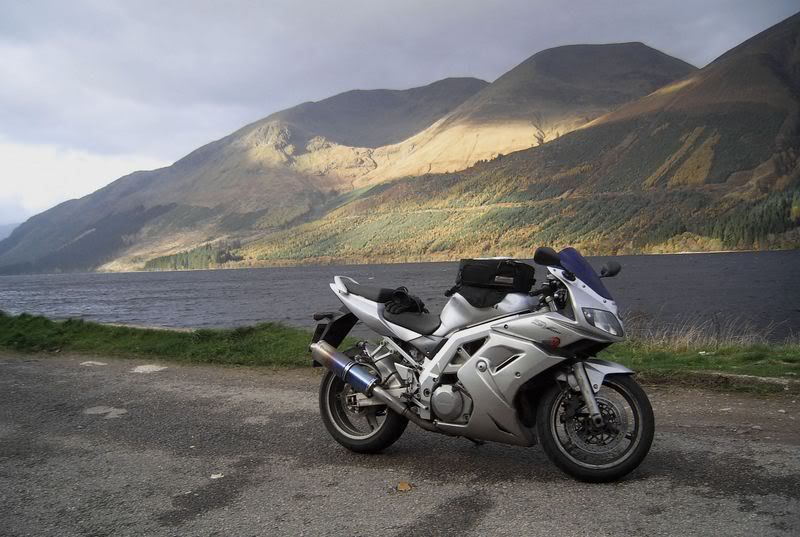
The trees and the lochs were so beautiful that the urge to stop and capture them on film came over me again and again. Mostly, I resisted. I needed to press on. But sometimes I just had to call a halt and get out the camera. It hardly mattered where. At every turn there were exceptional views. I found a narrow parking space beside the banks of Loch Ness. The lay-by gave entrance to an arboretum and to a walk that ran up through the wooded hillsides. A waterfall roared and foamed over steeply tumbled rocks before tunneling under the road and falling thirty feet into the waters of the loch below. I snapped it all up with the camera, every inch of it. I took off my outer gear, drank some water and just enjoyed the morning sunshine. I was in a
very good mood!
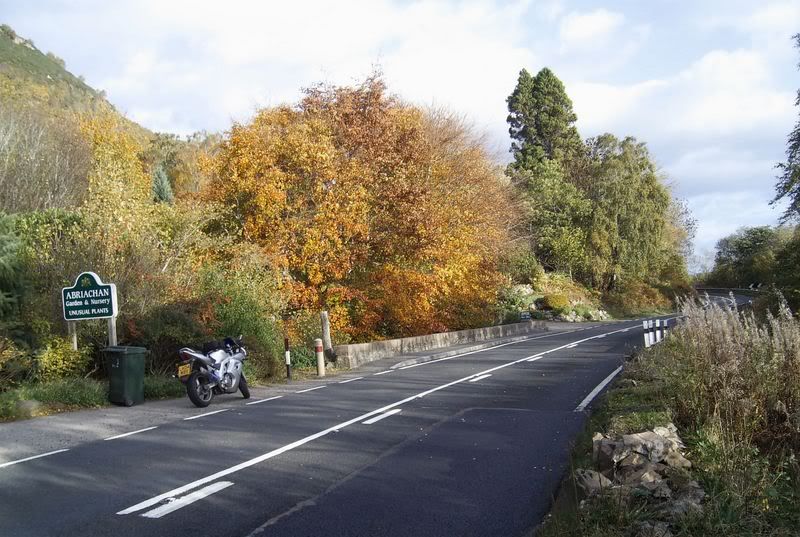
The traffic along the road was light. I left my lid and my gear with the bike and took a walk up along the woodland path. Birches and dwarf oaks predominated, radiant in autumnal gold. Fallen leaves strewed the little path. In the distance I vaguely heard the noise of a lorry rumbling along the road in my direction. I carried on up the hillside, enjoying the sensation of the sun’s heat. It came sprinkling through the thin leaf cover onto my head and face. Suddenly, from down below there was a whoosh of air, a warbled shriek from my bike alarm and a sharp crack. It was the sharp crack that worried me most. I ran back down the path and found my bike wailing but intact. My lid however, was lying upside-down on the ground some feet away.
One thing I never, never do is leave my lid on the saddle of my bike. Never, until today! The draught from the lorry had rocked the bike and shaken the helmet onto the ground. I checked it over. It must have hit a stone as it fell because there was a tiny hole right at the back of the casing. This was my new £400 customised lid, the one I’d been trusting after for months and was so proud of owning. dodo! "Et in Arcadia Ego!" I thought. That bit of school Latin has always stuck in my mind - Even in Arcadia, am I: there’s trouble, even in paradise! Dammit! It tarnished my golden mood, and for a moment the day tasted extremely bitter. Another lesson in pride and attachment to be absorbed and digested, and a hard one at that.
The bad feeling didn’t entirely leave me for some hours but it quickly evaporated from the surface of my mind. It was impossible to feel completely black inside for long on such a day and in such a place as this. Even so, It had blown out my mood for drifting comfortably through the landscape and I was now overtaken by the need to hurry. I had a mission to accomplish. I got back on the bike and fired her up. The road continued to twist excitingly around the lakeside spurs towards Inverness.
Twice by the roadside I saw flood warning triangles but there were no signs of flooding. That was odd. I’d been coming upon flood warnings ever since I’d got past Glasgow and up into the Highlands. But the roads appeared mostly dry and the land didn't appear to be waterlogged. I gave the warnings no more thought.
At Inverness I turned onto the A9 and immediately crossed a neck of water between the Moray and Beaulay Firths. Beyond the bridge lay the Black Isle - not an island at all but a peninsula shaped like a flint arrowhead. The waters to left and right were full of that dockland mood, massive; ringing with organized chaos; busy; and very focused.
As the road climbed over the dome of the peninsula I became increasingly aware of a buzzing in my helmet. I’d had hints of it for several miles, but now it became irritating and persistent. I thought at first that I’d picked up an unseasonable mozzie. But no, it wasn’t an insect. I pulled over at a lay-by and gave the lid a thorough inspection. A rocker in one of the vents had been damaged when the helmet fell and was now vibrating freely in the slipstream. I had nothing with me that would hold it still. I could have done without it: it was a constant irritating reminder of the damage that had been done.
Beyond the lay-by the road was curving down towards a low bridge – almost a causeway – that skimmed just feet above the choppy waters of the Cromarty Firth. It reminded me of a bridge of boats I’d once had to draw as a kid in a history lesson. Crossing the causeway so close to the surface of the Firth was exhilarating and brought home a sense of the suppressed power of all that water. As I rode, an onshore wind blew roughly up the channel. I opened my visor a fraction and gave my lungs good use of it. Wonderful! It buffeted the bike a bit but not enough to cause me any worries. My helmet buzzed away merrily.
A series of small oil platforms rose from the surface of the Firth. These were the first signs of major industry I had seen since I passed through Glasgow, now 150 miles to the south. But the land and the water around them looked perfecly neat and clean. I couldn't help thinking that if this were England there would probably be piles of industrial rubbish all around a commercial site like this.
I didn't have much time to look at the platforms before I was distracted by an oncoming van flashing its headlights frantically. The driver’s mate was making similarly frantic gestures and thumbs down signs. He’d seen me overtake a traffic queue and wanted to warn me of trouble ahead. The message was repeated again and again by other drivers. Saving my licence appeared to be a matter of the most urgent concern for them. The Scottish traffic police like their colleagues in Lincolnshire are notoriously hot on speeding. I took good note of my speedometer for the next four miles until I passed a police car lurking in a turning just off the main road.
The further north I went, the twistier and narrower the A9 became. It followed the contours of the coastline, dipping down regularly into the river valleys. The land was increasingly low and treeless now. Isolated houses and bungalows were dotted about on the cliff sides. There was nothing resembling a village here as it is understood in England, where overcrowding and property values concentrate the builder’s mind and housing densities wonderfully.
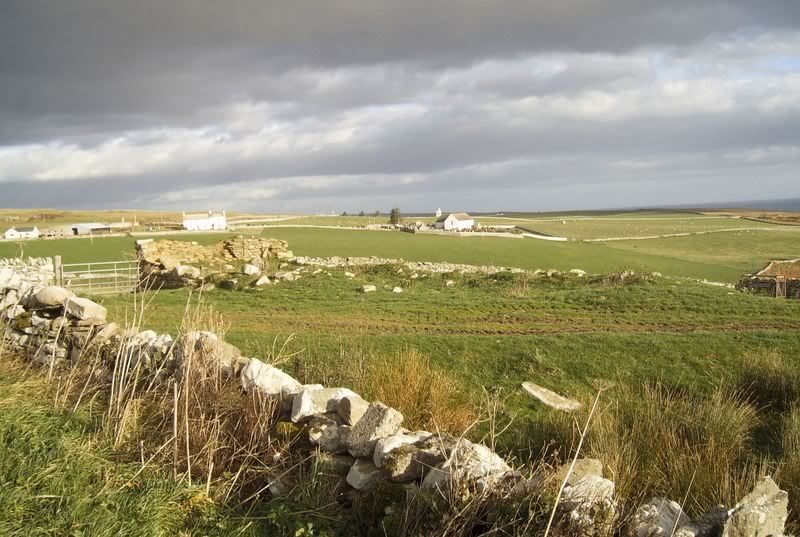
Just outside Wick there was more wild gesticulating from oncoming motorists. One extremely bony and elderly man was practically doing himself an injury trying to impress upon me the importance of slowing down. His warning was welcome though, for sure enough, a little further on, there it was, a radar van with some very determined looking police officers at the side of the road.
Wick was the first town in the far north I had come across. It looked as cold and wet and windblown as I had imagined. My fleeting impressions of it are of extensive road works; huge traffic foul ups (even here!); massy, stone-built public buildings the colour of fresh cow-pats; and exceptionally fresh-faced looking people, as clean and neat as the countryside about them. I ploughed on through the traffic queues, past a scruffy building site where a new, out-of-town Tesco’s was being erected (What will that do to the traditional local economy, I wonder). The bright company colours of red and blue glared synthetically among the soft natural tones of the land and local building stone. I didn't stop, but headed straight on up to John O’Groats in the most extreme north-easterly corner of the country.
Having seen other small communities in the area, John O’Groats was exactly as I should have expected it to be, but didn’t. It was just another windblown oupost of scattered buildings way up in the far north. Individuality rather than coherence was the guiding principle. There was little sign of the planner's heavy-handed meddling here.
Like everyone else in these islands, the name 'John O’Groats' has been part of my consciousness since I was a child, and without much thinking about it, I had built up a picture of what it would look like. And that picture was based upon what I knew. So, in my head it didn’t look that different to a town down in the South of England. But there is a world of difference between a busy little market town in Hertfordshire and a farming community in the Caithness region of Scotland.
I rode through its empty streets, looking for somewhere to eat. I’d imagined that I'd just have to stop off in the town centre, choose a restaurant or café and tuck in. Some hope! I did find a Post Office-come-local shop, though, and pulled up to ask what the town might have to offer in the way of lunch. (Come on! There
must be a pub serving food, somewhere here.) To my great relief, the friendly shop owner told me that, yes, there was somewhere I could eat in town. To my extreme puzzlement she then advised me that I should make for the knitwear shop down by the beach. I thanked her for the information and paid for a packet of Blue-Tack which I intended, at the first opportunity, to ram into the vent on my lid to get rid of the companionable little ‘insect’ that had taken up residence there.
I didn’t pursue the question of the knitwear shop with her any further, because I had one other need that had rapidly grown overwhelming. I needed to find a toilet as quickly as I could. I suppressed my scepticism and decided that the knitwear shop café, or whatever it was, would have to do.
[Warning. I have been told off before for being frank about this sort of thing on the boards, so I need to advise you that the next 3 paragraphs are not for those with delicate sensibilities.]
I hurried on down to the beach in the direction indicated and found a huge deserted car park. There, on one side, was the knitwear shop looking decidedly closed. And there on the other was a well-signed public toilet. Right now, that would do, thank you very much! I parked the bike and bolted for the entrance to the Gents as quickly as I could, only to find myself facing a turnstile and a notice demanding 20p. Oh Bugger!
The only coin I had easily to hand was a 50p. I knew I had a couple of 20p pieces, but they were in my wallet. Extracting money from an inside pocket when you are wearing bike gear is, as everyone on this site will know, not the most straightforward job in the world. As I pranced about yanking off gloves, tearing at zips, press studs, toggles, Velcro, I noticed an exceedingly annoying sign, which told me cheerfully that change was available, on request, from the attendant. I glanced across the deserted, out-of-season wasteland about me and my mood did not improve any. Fingers which, in the normal course of life, were perfectly agile had suddenly became all numb and fumbly. As my blood pressure rose, I began muttering to myself and called down curses on everyone and everything I could think of. I did briefly consider leaping the barrier, but then reflected that this might, in itself, bring its own unwanted consequences. I found the 20p and thrust it into the slot.
Most small communities like to identify something special about themselves. They like to boast that they have the best pumpkin show in the region; the best floral display; the best cricket or darts team; the best pub; the handsomest manor house; the most professional drama society. John O’Groats, is no different. John O'Groats, the most remote community in the kingdom, is, without question, exceptionally proud of its public loo. Giant, ‘Loo of the year’ awards for many succeeding years were displayed all over the gleamingly sanitised and hygienic walls. There is undoubtedly a parish committe, somewhere, devoted to rewinning the award again next year. But, you know, all those certificates did have their affect on me and I left that hallowed space feeling both chasened and a lot purer than when I went in.
Sad but true ->
http://www.loo.co.uk/
Edit: I found this later on the Caithness Community Website and couldn't resist posting it.
"The Highland Council has scooped seven national category awards at the 2005 Loo of the Year Awards, held on Tuesday during the World Toilet Summit in Belfast."
Emerging back into the car park with my senses rather more broadly focused than before, I suddenly realised that the sign I had been so annyoyed at earlier, had not lied after all. There, framed by the walls of a narrow cubicle, which was set between the Ladies and the Gents toilets was, indeed, ‘the attendant’, a woman of such massive proportions and severe demeanour that for a moment all thought and understanding failed me. Then, I felt embarrassed, certain that she must have heard my solitary, Gollum-like mutterings as I had struggled to get into the loo.
My mouth began to form itself automatically into a polite greeting but froze instantly on my lips. ‘The attendant’ sat utterly unmoving, staring stonily out across the empty car park towards the turbulent waters of the Pentland Firth like some ancient sea priestess in trancelike communion with the deep.
I wondered briefly if she had died at the end of the summer season and no-one had yet noticed. Then I wondered if she were like those mechanical laughing clowns or gypsy fortune tellers you used to find in fairground amusement parks. If I could find a slot somewhere in her booth and drop another 20p coin into it, she might speak to me and reveal some deep and secret truth known only people who live on the fringes of the known world.
As I crossed the car park once again to the Tourist Information Office a chill breeze whipped across its empty acres of tarmac making me shiver. I glanced back at the guardian of the prize-winning loo for a moment and revived my theory that she had indeed died. The general air temperature here were so low that she might have been preserved in her rigor mortis for months.
The Tourist Office was bursting to the seams with knick-knacks, leaflets and tourist junk but was resoundingly empty of customers. Behind the desk I found two human beings whose bodies were still warm and animated but whose manner suggested that their lives were surrounded by vast silences. I offered a greeting. In their response, they seemed to exude such genuine warmth and good nature that I wanted to hail them as long lost relatives and take them to the bosom of my family. And yet, at the same time, they remained utterly remote. I tested out my question on them. Was there anywhere round here were I might get a hot meal? (The knitwear shop seemed so utterly unlikely a possibility that I didn’t even dare to mention it in case they thought I was off my trolley.)
They consulted in voices that were extraordinarily gentle and quiet. Various possibilities were discussed and abandoned. (The knitwear shop was not among them). Eventually a phone call was made. The chef at the Seaview Hotel was still cooking, they told me - just. He would wait for me to arrive. I thanked them both and left. (Good grief! Up here? A ‘Seaview Hotel!’ In my world, 'Seaview Hotels’ belong to little old ladies taking dainty constitutionals on the prom at Eastbourne, not to the wild and rugged men of the north – I clearly needed to adjust my ideas.)
The ‘chef’ appeared from the bowels of the kitchen, looking every bit like the barman – which indeed he was. And no doubt he was the receptionist, porter, waiter and proprietor too. The bar-restaurant had a timbered and slightly nautical feel about it which reassured me somewhat. It was dominated, however, by a massive plasma screen. Two news anchormen were giving me the benefit of their oily opinions on the day’s news. The food was not only excellent, but there was plenty of it. It was one of the most wholesome and filling meals I had ever eaten outside my own home. I felt thoroughly comfortable here.
But I was utterly dumbfounded by the time. Two-fifteen said the clock. There were just two-and-a-quarter hours of daylight left, possibly even less this far north. I was never going to get down to the west coast before dark and I was certainly not going to manage the two biking routes. I would either have to compromise on my plan to include them, or… or I could lie, I thought! Yes, to my shame, that thought did flash briefly through my head. But only for an instant.
I needed a rethink.
I considered the possibilities. The one fixed point of reference was that, whatever else happened, I had to get to Dunnet Head. That was un-negotiable. I pored over the map book. I then assessed the various routes I could take back to Fort William in the dark. And then it dawned upon me that I had got myself stuck in some rather rigid thinking here. There was actually no necessity for me to go back to Fort William tonight at all. If I stayed out, I would have to pay for a second B&B - but why ruin the trip, disappoint myself and Annie and others who were supporting me for the sake of a mere £20. Instead of a disaster, I might just have an adventure on my hands. With all the extra time staying out would give me, where couldn’t I go? I might even get to visit the wild north-west. It would mean an extra day in Scotland and that might cause problems later on, but who knows? I decided to leave that one to fate. Right now I was off to Dunnet Head.
As I left the Hotel, a very ordinary blue bus turned a corner into this less than ordinary village. Well, of course. Why not? It just seemed odd, that’s all, like going to the moon and finding a branch of Macdonald’s serving cheeseburgers in the Mare Tranquillitatis. What had I expected? Maybe I should be checking the inhabitants to see if they all had six fingers on each hand. Or maybe I should be investigating the village hall or kirk for evidence of ‘the old religion’ and disturbing ritual practices. (I’ve seen the movies!!! I know these things!).
My road out of John O’Groats ran straight as a die along the coast and into the iconic west. Well why shouldn’t it? There wasn’t much here to prevent it going anywhere it damn well liked. And as roads are rather scarce up here in Caithness it might as well be economical about it. If the landscape in this north-eastern corner is not quite flat, it is certainly very low, very bare and featureless. There are few trees. What vegetation there is has a windblown look – as do the people. On my first arrival here I'd missed the mountains but now I found myself enjoying all this open space. My consciousness went rolling across its wide grasslands: my eyes relaxed onto its distant horizons. By the time I had ridden the 20 miles to the Dunnet Head turn-off I was so mellowed out that I rode straight past it and had to double back.
The rusty-brown ‘road’ up to Dunnet Head tried to lose itself in the boggy, rusty-brown land. Here and there I saw quiet herds of rusty-brown Highland Cattle with shaggy coats and huge, elegantly sculpted, rusty-brown horns. Here and there, too, there were black, acidic pools of standing water - unnatural and unmoving surfaces that bitterly reflected the clouds and sky. It was a desolate place. Apart from some evidence of turf cutting, the peninsula seemed entirely natural. And yet, as I looked about me - despite all evidence to the contrary - I couldn’t help thinking of the slag heaps and rotten-topsoil of England’s industrial wastelands. If this was truly nature at work, then it was nature at her most forlorn and suicidal.
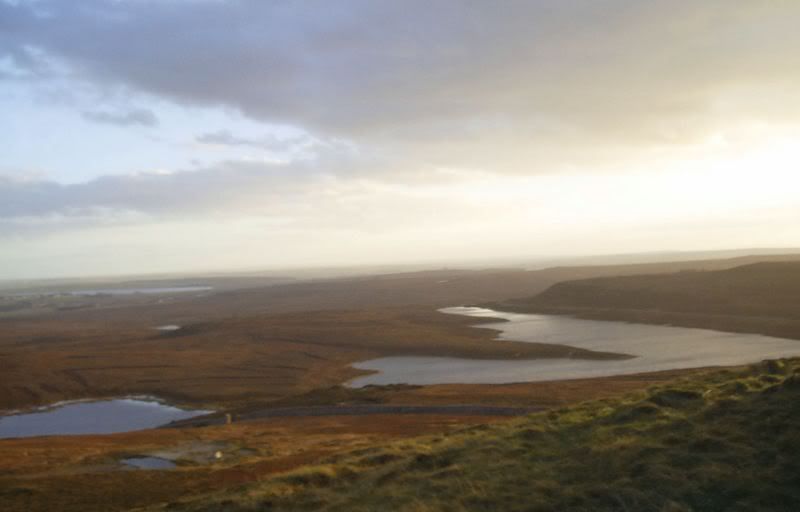
The Peninsula wasn’t entirely deserted. Here and there, at its most southerly end there were tiny communities of people who drove old cars, had craggy faces, and scowled at me as I passed. Now, that’s more like it, I thought! There was even one place big enough to have a signboard and a name. ‘Brough’, it was called. Most unlikely! It was a grey little place. It should have had chickens clucking about in the gardens and running across the road. But it didn’t. I imagined that the whirlwind which had snatched it up in Kansas and dropped it here unceremoniously on Dunnet Head must have left Dorothy and all the chickens behind.
The Peninsula was even big enough to have a proper loch. It was disappointingly round, unlike all the other lochs I had seen, which were long and narrow. It was a sad and dismal thing, and also a little creepy. St John’s Loch it was called. And I can well imagine the evangelist sitting here upon its banks having dreadful visions of the end of days. I know I would!
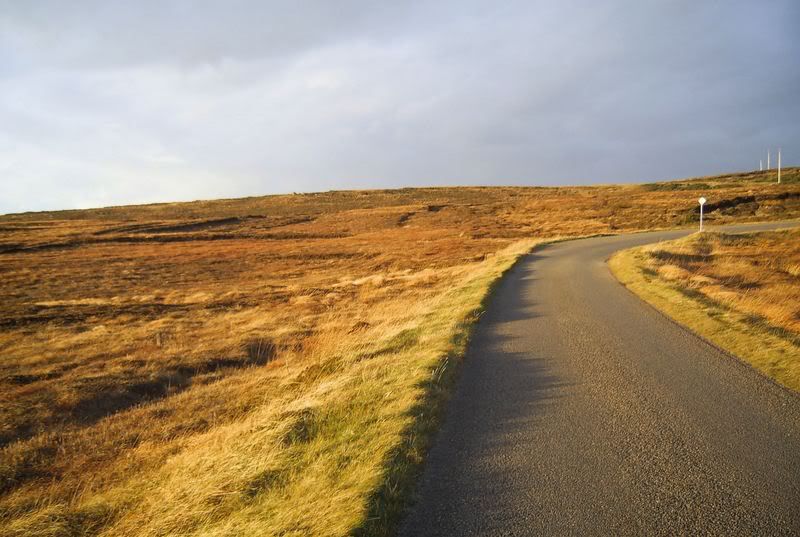
The ‘road’ that had skirted it and set off across the dun grasslands of this northernmost peninsula was twisty and narrow and fun to ride. Evening had not yet begun to fall, but the day was growing thin and there was need for haste. I was in a hurry: not anxious, not driven; just in a hurry. When I enter that frame of mind, I disengage most completely from all my anxious, nay-saying voices and my ride becomes a dream.
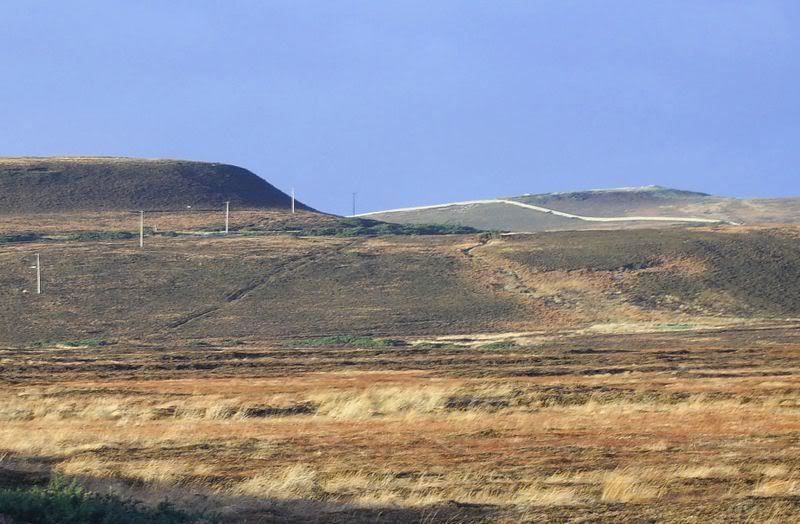
I’d decided on a plan (or rather, the plan had decided on me). The plan was this: to travel as far west along the northern coast as I could before it got too dark or I got too tired and then, come tomorrow, whether it rained hard or just rained I would travel down the entire length of the North-West Coast, keeping to the sea road, cutting no corners, taking in every little bulge and bay and riding the two DVLA bike roads before going back to Fort William and supper. Do it! I told myself. Just do it! No compromises!
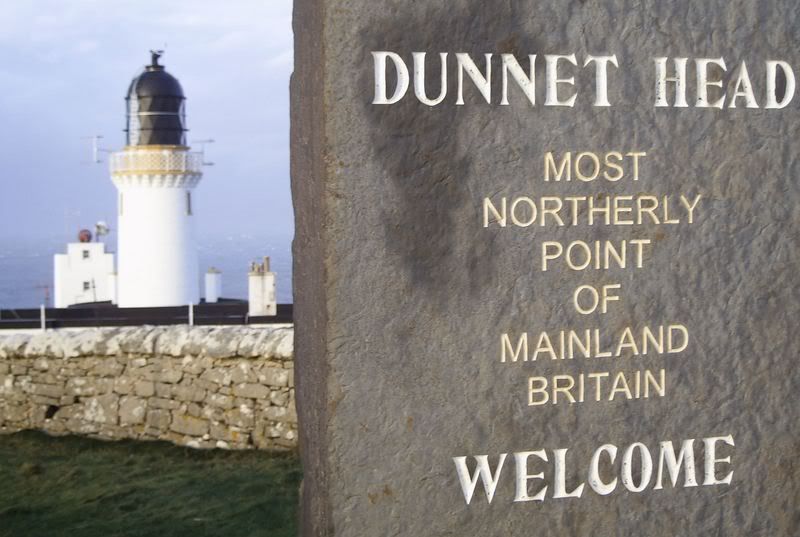
Of course, judging by the time it had taken me to get this far today on a major road and in dry conditions, there was no way that this little hatchling plan was going to be at all achieveable. It was a foolish idea. But I have many foolish ideas. They are born out of sheer bloody-minded wilfulness and a kind of hyper-optimism that will invest the most unlikely notions in glowing colours and see me through with a sunny smile. If things don't work out as planned there are always other possibilites: possibilities that include the unexpected and the adventurous. I’ve had many great adventures thanks to my foolish ideas. And sometimes, if you are foolish enough, the impossible becomes possible. ‘Cos the impossible is only impossible to THOUGHT. (Sounds good eh?)
Having written that, a host of critical voices have suddenly elbowed their way into my mind. Proper, responsible adults often cluck and tutt and my impractical take on life and like to remind me, whenever they can, of how stupidly optimistic or risky are some of the things I do. Di did, all the time. But here, riding my bike - my freedom machine – right up in the far north, with just miles of possibility stretching out from me in every direction, none of their practical advice or cautionary admonitions seemed to make any sense at all.
I reached Dunnet Head, the north cardinal point, prised three small stones from the earth for Annie, and rode the bike up to a viewpoint overlooking the lighthouse. There I sat for a while in the saddle breathing in the salt air and feeling completely at peace with myself. I gave myself just ten minutes. I didn’t have time to spare for much reflection but absorbed what enjoyment I could from this wild and joyous place. In my diary I wrote, “Sitting here at Dunnet Head, looking out to sea, I’m chuckling in my lid, suddenly filled with a manic sense of freedom in which anything seems possible.”
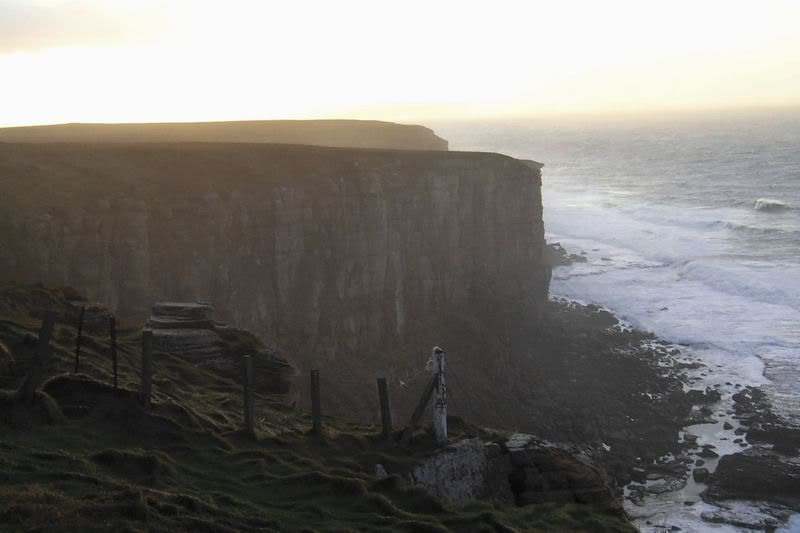 The sea cliffs, seen from Dunnet Head
The sea cliffs, seen from Dunnet Head
My next stop was… I wasn’t sure. Somewhere west. Somewhere where I could fill up the tank, I realised. That probably meant Thurso.
Thurso looked remarkably comprehensible to me as a town, a huddled community with solidly built terraced houses and public buildings. It had that essential element of all urban communities, a tension between rich and poor. Big houses, their wealth secure behind wrought iron gates, shouted their status at rows of small-fronted workers cottages whose front doors opened straight onto the streets. And there were signs of a civic middle-class's preoccuption with town planning and pomposity.
I stopped at a garage and filled up the bike. The woman attendant in the office wasn’t busy and was ready to chat. We talked about the tourist trade and the economy and the weather. I asked her about the flood signs I had been seeing. She nodded and told me that in the week before I had arrived, the region had seen the worst flooding in living memory. So that was it! I was lucky then. If I hadn’t had to delay my start (yet again!) I would have been here in all that wet weather.
Getting out of Thurso proved to be slightly more complicated than I had bargained on. As I left town, I found myself on what I took to be the ‘wrong’ road (the A9 again) which would take me back southwards down the east coast. Oh bugger! But I’d made a pact with myself to let fate take a hand in this, so I decided just to carry on and see what happened. It didn’t necessarily mean I was heading back towards Fort William. I could still find somewhere else to sleep tonight and then cut west if I wanted to, but it would mean missing the north-west corner.
And then I realised it wasn’t the 'wrong' road at all. The road swung round and once again I found myself riding into the westering sun. I had decided to let fate choose a route for me. It had taken hold of the reins (the clip-ons, anyway) and was winging me once again along the north coast towards Tongue. Though the late afternoon had begun to drain a little of the colour from the landscape I was still feeling sunny inside.
I suspect fate, or something like it, plays a much bigger part in our lives than we like to imagine. And I’m not so sure that is a bad thing. Many years ago when I was studying in Hull, I read a book called ‘Witchcraft among the Azande’. All the anthropology students were reading it. I was doing philosophy at the time, not anthropology, but it caught my interest. Members of the Azande tribe all carried a simple mechanical yes/no ‘oracle’ with them which they used to decide everything they did – and that really meant everything, from trivial, every-day issues to matters of life and death. The writer concluded from his research among them that by handing over control in this way, they led lives that were just as successful as any other culture he had studied including our own. I found that bothersome and extremely reassuring at the same time.
From John O’Groats, to Thurso and then beyond to the village of Melvich the A836 undulates gently along the line of a coast which provides little to distinguish one mile from the next. It is an unadventurous road but a pleasant one if you are happy just to bowl along through the landscape. The SV is very comfortable on a road like this. Though it is a big bike, it will cruise sweetly at 60mph for as long as you like without complaining, and then, if the mood takes you, it’s just as happy to wake up and stretch its legs a little. There is not much that it doesn't do well.
Amid all this sameness, the sight of a giant white golf ball pointedly sitting on the landscape ahead came as something of a shock. It appeared totally incongruous in every way. Either it was a nuclear power station, I thought, or something to do with the military early warning system. Then, I realised it must be Dounreay, one of Britain’s first generation nuclear reactors; ageing now and with a safety record that left something to be desired. I’d forgotten that it was located up here. I found myself hurrying past.
Beyond the reactor lay a hardnosed compound of low buildings fronted with a large sign, red on white, which declared it to be the offices of the British Atomic Energy Commission. And beyond that was the little village of Reay. The village probably provided a fair bit of the labour that kept the reactor going. I kept my eyes open and was reassured to see that none of the inhabitants were actually glowing as I passed by.
Reay was another spread-out village that looked as though it only had a temporary footing on the landscape. Several of the houses were made of clap board. I hadn’t seen any up here previously. It is unusual anywhere in the UK. I wondered how warm they would be in winter. Indeed, I thought, if I lived in Reay I would probably have insisted on nothing less than a house with two-foot concrete walls and probably lead lining too.
After Thurso the land to the south begins rising again gently, forming itself into distant peaks. Then suddenly, beyond the little village of Melvich the hills sweep norhward down to the sea. The road rises and the land grows mountainous again. Flat grassland gives way to moor and bog and the road, which, until then, had had two lanes, a decent camber and a white line down the middle, narrows to a single track with regular passing places and a very uneven surface. It is as though molten tarmac has simply been poured out in a long ribbon upon the face of the moor and allowed to set. All the humps and bumps of the terrain underneath – and it is
very humpy and bumpy – are reflected in the surface of the road.
But despite all this, it is still a British A road. I had difficulty keeping that in mind. Although there is very little traffic to be encountered along it – very little – there is some, and that traffic consists of all the same sorts of vehicle you would find on a normal A road – vans, busses, lorries, and trucks as well as cars. Suddenly I'd turn a corner to find a huge twelve-wheeler coming straight at me with its rubber completely straddling the ‘highway’. Incredibly, with the frequent passing places, this arrangment works perfectly well.
If the road made little impact on the landscape, then the moorland sheep and wildlife could hardly be blamed for ignoring it. Flocks wandered across it witlessly. Woodcock and pheasant and partridge seemed to have a positive preference for it. I’d seen no deer so far, but no doubt they were there too and, as the hills rose, it was only a matter of time before I would come across them - hopefully not in the middle of a blind bend.
The village of Bettyhill gave me another surprise. I just wasn’t expecting to find a substantial community up here and certainly not one as pretty as this. The road had dipped down into another depression and then cut through a small gully with overhanging rock walls. In the gully, beside the road, were several very attractive little cottages. Beyond the gully, there were more cottages and bungalows and the beginning of a town or village. Then suddenly, the road swung left into a long green valley and there amid the moorland wastes I found myself stumbling into a veritable Shangri-la. The light was fading now, which probably added to my romantic notions of the place, but it was attractive.
Later, I learned its history, which is probably more curious and interesting than my twilight fantasies about it. Bettyhill was, according to a guide book I read, a ‘charitable’ experiment, established in the eighteenth century by ‘Elizabeth, Countess of Sutherland’ as a refuge for crofters evicted from their homes during the Highland Clearances - a small comfort for a lucky few. It occurred to me later still that maybe the ‘thoughtful’ Countess had been responsible for evicting the crofters in the first place, which, on further enquiry, turned out to be the case. Today, the village appears to be a popular centre for huntin’ shootin’ and fishin’ folk. On the other side of the valley was a beautiful, deserted beach (white-water breakers slow-crashing onto acres of sand). This was the first of many such that I would see in the following days.
http://www.undiscoveredscotland.co.uk/b ... index.html
Up on the hills the wind grew blustery again. The night was coming down now and I had to take extra care. A few light showers came and went. There had been no spectacular sunset tonight, just a creeping greyness. It was time to stop.
Tongue also took me by surprise. It was tiny. But there were a couple of hotels. I gave the first a wide berth. It was very flash and ugly-looking, over-decorated and probably expensive. The second looked more like a country inn. More my style! I parked the bike and enquired the price. Too much! The friendly landlady referred me without a thought to a B&B just thirty yards down the road and suggested that if I needed an evening meal I could come back at eight. That sounded pretty good to me.
I found the B&B. It was a pleasant looking house overlooking a hairpin bend on the road. The owner was friendly but troubled. She had a room free but was expecting the double-glazers in first thing tomorrow morning. What time did I want to leave? As early as you like, I said, and felt very heroic as I said it. The terms were good – very good, in fact – so the deal was done. She showed me the room. Actually it was an entire flat and had a bathroom as big as my living room, bigger probably. And... the bathroom had a Jacuzzi. Luxury or what! And all for twenty-five quid!
I bathed (wasting ten minutes trying to locate the on-switch on the Jacuzzi - it was under my arm), read till 8 o’clock, then made my way over to the Inn for dinner, feeling a little self-conscious as I had no change of clothes with me and was in full bike gear. The dining-room/bar-room was panelled in dark wood and lined with maps and hunting trophies. It was quiet and nearly empty. At one table, a group of three local lads were playing a mean game of dominoes and drinking. At another, curiously, there were three Frenchmen, one of whom the landlady clearly knew well and referred to as ‘Doctor’. The conversation was genial and subdued.
The menu, on the other hand, was excellent. I went through the dreary business of explaining my allergies and got my order sorted. Or so I thought. When the food came it was utterly laden with everything I couldn’t or shouldn’t eat – nothing that would cause me a major problem but quite enough to make me feel uncomfortable. It wasn’t the landlady’s fault. She had gone to considerable lengths to accommodate me. It was all a misunderstanding. But the Inn was cosy, the food looked so good and by that time I was so hungry, that I said nothing, hoped for the best and tucked in.
It was delicious. Even after thirty years I still miss a lot of the foods I’m allergic to, so the meal went down very well. Inevitably, though, I was soon feeling achy and spaced out, but I was determined not to let it spoil a pleasant evening. There was some good cider on tap to round out the meal. Outside the wind was getting up. It howled around the corners of the Inn, dashing gusts of rain against the window panes. The landlady breezed cheerfully in and out. The fire blazed. The dominoes clacked and the quiet conversational French drifted round the room.
Eventually I had to tear myself away for the night. I zipped up my jacket, and held onto my cap as I walked the few yards back to the B&B. The rain was drenching now. And the wind was tearing at the trees. Leaves and twigs whirled about in the gusts. The Norwegian guy I met this morning had not been wrong about the weather. It looked like it was going to be quite a day tomorrow.
